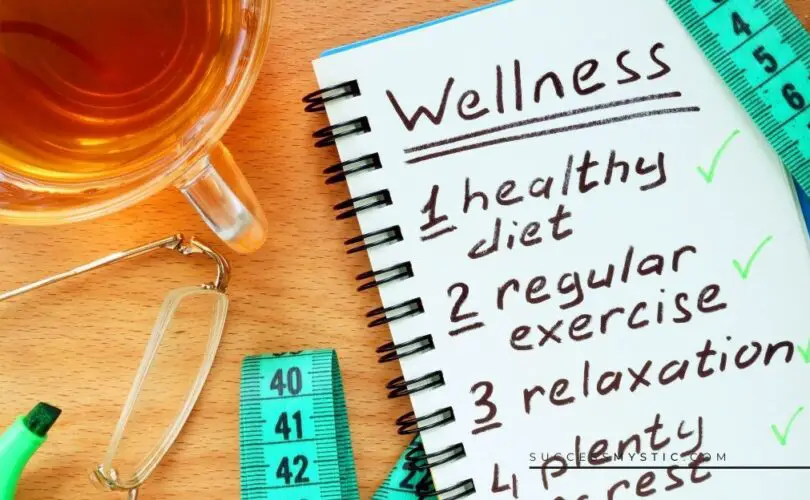In this article: Improve all areas of your life and self emotional, mental, physical, and social and lifestyle
When people talk about wanting to get “well” or become more fit, but what they really mean (most of the time) is to be physically healthy. But physical health is only one dimension of wellness, and until you restructure your life to include all components that influence your well-being, you cannot hope to achieve wellness.
Wellness is the integration of physical well-being with your mental and spiritual health, as well. To attain wellness, you must strive to live more fully and work toward reaching your goals.
Wellness involves daily habits and routines that help you achieve not only physical health and strength but also remain psychologically and emotionally positive and balanced.
Ultimately, wellness is about caring for yourself and your loved ones in ways that are meaningful and important for you. Self-care and self-awareness are crucial for attaining wellness and represent the cornerstone of all wellness practices.
This guide helps you explore the many dimensions of wellness as well as how to restructure your life to include the routines and habits that will help you achieve this goal. We explore what it means to be truly well, the role habits and routines play in maintaining wellness, and the specific strategies that can help you achieve this goal.
What is Wellness?
Wellness used to just focus on the physical body, but over time, we have learned that just being physically healthy does not provide well-being.
Today’s definition of wellness has grown to include eight distinct and interdependent dimensions of wellness. These are:
- Physical wellness, which includes caring for your body to be strong and fit not only now but also in the future.
- Intellectual wellness, which requires that you grow intellectually and maintain curiosity throughout your life. Lifelong learning and being open to challenges of the mind are also included in this dimension as well as sharing your knowledge and skill with others.
- Emotional wellness, which is the understanding and respect you have for the values, feelings, and beliefs you and others have. Emotional wellness includes feeling positive about your life as well as managing your emotions to create constructive outcomes.
- Social wellness, which encompasses your ability to create and maintain healthy bonds with others, spending time with loved ones, and caring about the needs of those in your social circle as well as your community.
- Spiritual wellness, which involves finding a purpose or meaning in life while embracing activities that are consistent with your values and morals.
- Vocational wellness, which is often overlooked, involves finding work that gives you satisfaction and personal enrichment while aligning with your goals and values. Work should be a way that you contribute your unique gifts and talents with others for a result that is rewarding to you.
- Financial wellness, which includes your ability to manage your resources to live within your means while making sound decisions that help you both now and in the future. Being financially well enables you to understand your financial needs while respecting that others’ will differ from you.
- Environmental wellness, which includes your understanding of how all the various environments in which you live and exist affect your overall health and wellness as well as your impact on the planet.
Your quality of life is influenced by all eight of these dimensions, which is why neglecting one can adversely affect all the others. All eight dimensions do not need to occupy equal importance in your life, and their role in your happiness will shift over time. What is most important is that these are balanced in ways that bring you personal harmony and match your own priorities, goals, and values.
What it means to live a full life is very personal and individual, and how you choose to balance all these dimensions for yourself it entirely your choice.
Turning Knowledge into Action
While we must recognize and understand the various dimensions that influence our wellness, what is even more important is what we choose to do with that knowledge.
Most people today know what is and is not good for your health, and yet we, as a society, are unhealthier than we have ever been. Changing behavior, not just understanding, is the key to restructuring your life towards wellness.
Behavior is the combination of what you do, how you do it, and your success in accomplishing what you set out to achieved. As humans, our behavior is influenced by many factors, only some of which you can control.
The key to changing your life and adopting practices that contribute to your wellness is in controlling these known factors. The two most relevant for adopting a wellness-centered lifestyle are habits and self-regulation.
The Power of Habits
Habits are the things that we do without much thinking, and our brains love them! When something becomes a habit, we do it automatically, which means we do not have to think about it or waste energy considering it. Habits free up mental space for other things to occupy your mind, which is why, once we find things that make us feel good, we keep doing them to cement them into our routines.
The more habits we have, the less self-regulation we need (more on this in a minute), which means our brains can focus on more important matters and decisions. Habits are so powerful that about 40 percent of everything you do in a day is some type of habit.
That means if you develop healthy habits, you have a much more likely chance of achieving wellness, and if your habits are unhealthy, then your chances are pretty slim. Changing your habits is the key to restructuring your life.
The Role of Self-Regulation
In contrast to habits, self-regulation requires a great deal of mental energy, as it is the conscious direction of your actions and the controlling of your impulses to help you reach your goals. Self-regulation allows you to remain focused on meeting standards or ideals that are aligned with your values and keeps us acting in ways that are consistent with our beliefs.
And while it may seem that self-regulation is about controlling or regulating your behavior, it is more about managing your emotions. Your feelings are what drive your impulses and choices, and self-regulation requires an ability to monitor your emotional health to ensure that strong emotions are not the driving force of your decisions and actions in life.
Learning to act in ways that serve your best interest and help you achieve wellness requires mental and emotional energy that overcomes habits. Your brain automatically resists this, because it craves routine and patterns that expend less mental capacity. Learning to harness your self-regulatory systems, then, can help you change your habits over time.
The Role of Structures in Wellness
The more structures you have in your life, the easier it is to get things done. Structures, such as routines and protocols, are anything that streamlines how you perform a task or make a decision.
Structures enable you to maintain the balance in your life that leads to wellness, while it can be energy-consuming to create these habits, once they are in place, you are much more likely to stick to the healthy routines that will enable you to achieve wellness.
Structures in your life help you maintain your healthy habits. Signing up for an exercise class makes it more likely that you will workout regularly. Prepping your gym bag the night before and leaving it by the door also increase your odds of moving more frequently. These are structures that can improve your physical and mental well-being.
Structures like these lower your stress and reduce your need to have to make decisions or solve problems. You know what you are going to eat today because you planned a menu, shopped, and prepped food, and everything is ready for you to enjoy. You have fewer choices to make, which makes it easier to make the healthiest ones.
Structures also help you develop new and healthier habits. Instead of spending the first 30 minutes of your day laying in bed and wishing you were back asleep or checking your social media pages, you can develop a new habit of exercising first thing each morning by putting in structures that will make that much more likely to happen.
We are creatures of habit, and we love routine. Adopting structures that promote wellness in all dimensions can help you achieve your goals in these critical areas.
Here are other ways that routines and structures can improve your life:
- You will have less stress. Routines allow you to plan for when things will get done, so you do not have to worry about them.
- You will sleep better. Routines ensure you have enough time in your day to get things done, so you are not sacrificing sleep by catching up on forgotten tasks.
- You can eat healthier. Routines give you the time to plan your meals, buy groceries, and prepare food that is healthier for you than grabbing a meal through a drive-thru window.
- You will be more productive. Routines help you make better use of your time and ensure that things get done, giving you more time to enjoy your life.
- Routines can give you more mental energy for the things that are important to you.
Changing Habits
Habits are any behavior that is recurrent, occurs because of a specific cue, and happens without much intent or awareness from you. We form habits through frequent repetition, and they are made permanent because the reward we receive is in some way positive.
We sense a cue, so we engage in the habit to get the reward. Habits never really go away from our mental wiring, but we can replace them with stronger habits.
Because of the long-lasting nature of these neural connections, habits are hard to change.
While self-regulation (also called will-power) plays a role in changing habits, it is much more complicated than that. You must change the path the message takes in your brain. The cue stays the same, but the routine changes to create a new behavior, which elicits the same reward. Here is an example.
In an unhealthy life, a cue of “I’m bored” might elicit a habit of mindless eating, which results in the release of hormones and chemicals in the brain that momentarily make you feel better. In the long-term, though, this habit leads to weight gain and depression in many people.
When you are trying to change your habits, the old cue stays the same (“I’m bored”), but instead of reaching for food, you reach for the phone to call a friend or you get up and walk around your neighborhood once. Both will elicit a positive response of making you feel more engaged and connection without the need for food to boost your hormone levels.
Sounds easy, right? The act of changing your routine to create new habits is what is so difficult. Even when we know our old habits are unhealthy and possibly even killing us (looking at you, smokers), knowledge is not enough to create lasting change. You need self-awareness and specific change strategies, too.
Self-awareness means you understand your strengths and weaknesses, and you create routines that will make the most of these aptitudes. Habits that work for you will be crucial to your success, so instead of adopting generic new practices, you pick those that will reflect your natural tendencies and build on your gifts.
When you know yourself, you are better able to cultivate habits that are aligned with your natural rhythms and propensities rather than always going against those, which is a sure way to fail.
Adopting change-related strategies can also help you enhance your chances of changing your behavior for good. Some strategies that are connected to long-term change include planning for setbacks, paying attention to your own rationalizing actions, developing accountability systems, monitoring your progress, and figuring out rewards that work well for you. Figuring out the right strategies for you, using your self-awareness, will help improve your chances of success.
The Wellness Habits that Will Restructure Your Life
With all that in mind, the following wellness habits are offered as options from which you can choose depending on your own wellness needs and which areas of your life are out of balance.
Once you have determined which new habits will help you create harmony in your life and achieve your wellness goals, you can use the strategies and routines that work best for you to implement new change.
1| Become Mindful
Perhaps the most powerful habit you can develop to improve your overall wellness is that of mindfulness. When you learn to become more consciously aware and present, you stop operating on autopilot and make more intentional choices in your life. Mindfulness makes you aware of what you are doing and how it is making you feel, which gives you better information for creating new and more healthy habits.
Mindfulness makes you aware, for example, that while you feel better for a short time after eating sugary foods, you actually feel much worse not long after, and that sugary foods often do not even taste all that great, once you pay attention. Mindfulness can help you stop unhealthy choices in their tracks and make you more aware of the long-term benefits of making different choices.
Mindfulness is the key to self-awareness, self-regulation, and changing your habits and structures. Without this one practice, you will always struggle to control your emotions and to be in tune with your self and your needs. Learning to practice mindfulness daily should be the first step for anyone wishing to structure their lives toward wellness because within it lies the keys to success.
2| Practice Self-Compassion
Learning to be more compassionate toward yourself is an important part of your emotional wellness. True happiness within yourself cannot exist when you do not love yourself or cannot accept who you are. When you engage in self-criticism or punishment as we way to encourage yourself to change, you are doing more harm than good. Being compassionate means setting realistic expectations, supporting yourself when you experience setbacks, and being kind to yourself in the same way you would treat other people.
When you treat yourself with compassion, you accept your flaws, you forgive your limitations, and you see yourself as a unique human who deserves love, joy, and happiness. And when you can embrace this view of yourself, you learn to love who you really are and can finally be at peace.
3| Be Kind to Others
Giving unselfishly of yourself is one way to not only help others but also help yourself. When you are kind and generous to other people, you enjoy may positive health benefits, including reduced stress, decreased blood pressure, and lower levels of pain and depression. People to volunteer regularly or help their fellow humans also live longer and report being happier, overall. Find ways to give back in your community to experience the positive results of kindness toward other people.
4| Make a Plan
Being prepared and planning ahead are the surest ways of developing new, intentional habits. “Failure to plan is a plan to fail,” is a common but true adage. Schedule time in your day for all your highest priorities, so you will make the time to do them.
Think ahead to ensure you have what you need to get in your daily workout. Plan for your meals so that you have the right ingredients and know how much time you need to prepare each dish. Better yet, cook everything on the weekend, so you do not have to create more time in the kitchen during your busy week. Making a plan creates opportunities to make better choices, which makes for better habits over time.
5| Create a Positive Environment
What you sense from your surroundings has a powerful influence on you. The sights, smells, and sounds of your immediate and peripheral environment influence you in ways you may not even recognize. Creating as many positive aspects to your home and work areas as well as controlling those parts of your environments that you can is crucial to your wellness.
Start by eliminating negative influences on your mind. Do not watch depressing movies or listen to 24-hour news all day. Eliminate clutter that can cause stress and anxiety. Fill your space with positive images, smells, and sounds that will lift your mind and help improve your emotional and spiritual well-being.
Try turning off all notifications, ringers, buzzers, and other distracting noises in your home and see what a difference it makes. Try listening to upbeat music during your daily routines and bring in more natural elements inside your home. Find ways to add positive elements to your work environment. The more you can bring features you enjoy into your space, the happier and more relaxed you will feel.
6| Meditate
Meditation is a technique that is good for your mind, body, and soul. Meditation is simply a focusing exercise, during which you push away all distracting thoughts and focus on one thing, which can be an object or just your own breathing. Meditation teaches you to be more focused, increases your attention span, and helps you deal with distractions.
Those who meditate have lower levels of stress and live longer. If you have anxiety, meditation is a recommended therapy, as it teaches you to stop listening to the nagging worries that plague your brain. Set a time to meditate every day and honor it. The more you do it, the easier it becomes and the more positive the results.
7| Focus on Eating Healthy Foods
Rather than worrying about how many of this or how much of that you should have, focus on intentionally eating as many healthy, whole, natural foods as possible in a day. The more whole foods that come from plants you can eat, the healthier your body and mind will be.
Avoid processed foods and food high in sugar, salt, or unhealthy fats. If it comes in a box, bag, or container, there is a healthier option. Food provides your body all the nutrients it needs to survive, and when you feed it junk, you will feel like trash. When you offer it abundance, it will respond with vitality and energy.
Start small and plan all your lunches for a week or concentrate on cooking three healthy meals each week. As you learn new recipes and build up a pantry of healthier staples, you can move to a weekly meal plan that is easy to keep up with. Planning what you want to cook and shopping ahead of time will ensure you have everything on hand to make the right food choices, no matter how you are feeling that day.
8| Stop Arguing
We all slip into old routines and unhealthy habits when trying to restructure our lives. That is to be expected and nothing you should be ashamed of. What is troubling, though, is when you argue with yourself about why it was “okay” that you made those unhealthy choices, to begin with.
You tell yourself that you were too tired, or it was such a stressful day, so it is fine that you skipped your workout. You argue that you are too busy to spend time with your friends this week, even though you have not seen them in a month. This type of arguing is rationalizing, and it is just another way to make excuses for wanting to slide back into old habits.
You deserve more than that. You deserve better. You deserve happiness and wellness in all aspects of your life. So instead of putting all the energy into coming up with arguments to justify you bad choices, spend that energy coming up with reasons why you need and deserve to care for yourself. Restructuring your life for wellness takes effort and commitment, and that is something you must renew and recommit to each and every day.
9| Start Your Day Positively
Each day should start with an intentional focus on what is crucial for you and what you need to do to make the most of your day. Waking up just ten minutes early can give you time to meditate and engage in proactive routines that will make your day run smoothly.
Getting up 45 minutes early gives you time to work out before your day even begins, giving you the rest of the day to enjoy and feel energized. Set an expectation each morning that you will have a positive and productive day, and you will!
10| Connect with Others
Your social wellness is an important part of your well-being, so connecting with friends, family, and romantic partners is crucial to achieving your wellness goals. Schedule regular get-togethers with friends.
Make a date with your partner. Spend time with or make a point to call family members to stay connected. Maintaining social bonds is critical for achieving true wellness.
11| Get Enough Sleep
Proper sleep routines and ensuring that you get enough sleep is vital for your mental, emotional, and physical health. When you give up sleep in favor of other activities, you are neglecting a significant aspect of your wellness. Go to bed and wake up at the same time every day. Be sure your environment is conducive to sleeping. Be sure you are getting at least seven hours of sleep to keep your mental and physical health strong.
Final Thoughts
Change often takes a long time, and you will have to try a lot of different things (and fail at more than a few) before you find the right combination of structures and habits that work for you. But even unsuccessful attempts at improving your wellness are better than maintaining a status quo that is contributing to unhealthy behaviors.
Wellness is dynamic and ever-changing, so what brings you balance now will alter over time. It is important to check in with yourself regularly to see just how harmonious all the elements of wellness are feeling in your life and adjust accordingly, as well.







